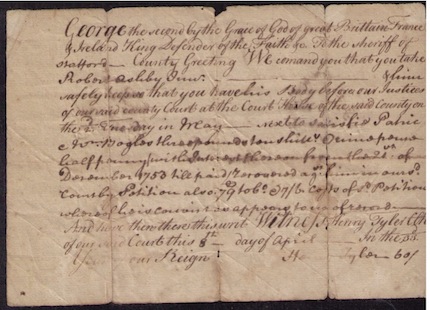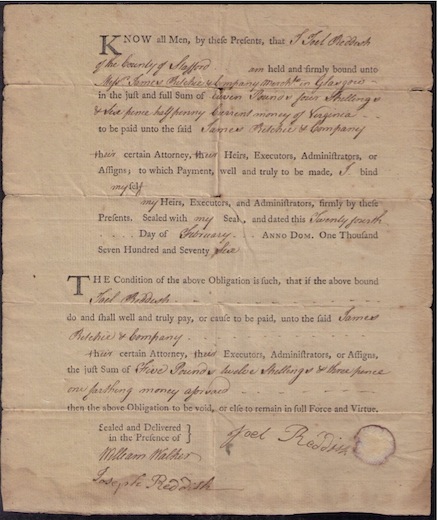Top 15 Posts of 2013—Number 13: Repatriating Court Documents Stolen from Stafford Courthouse, Virginia, by Union Troops in 1862
Guest post by George H. Bresnick, director of the H. Stanley Bresnick Foundation
The countryside around Stafford, Virginia, was devastated by the occupation forces of the Union Army in November, 1862. So severe was the physical damage and the loss of population that it is said that the land and the populace around the township of Stafford Courthouse didn’t recover fully from the war until almost 70 years later. Two-thirds of the documents in the Stafford County Courthouse were either burned or stolen. Only two have been repatriated: a deed book returned from Maryland shortly after the War and a court ledger book stolen by a Massachusetts officer and returned recently to the Library of Virginia by a library in New Jersey that recognized its provenance. Against the loss of human life and suffering, the loss of a cultural patrimony pales. Yet there are certainly practical effects, such as verifying the deed to a property one would like to buy only to find that most of the evidence prior to 1862 is gone. Of significance also is the psychological impact resulting from the destruction of the written records of a culture by an invading military force.
In 2009, an elderly woman who lived in the old Methodist Episcopal Parsonage, in the village of South Worthington, Massachusetts, across the street from my home, passed away in a nearby convalescent home. When a family member, who was the executor of her estate, asked me to help triage the contents of the house, I found a packet of papers in the proverbial “old trunk in the attic.” The papers were mainly deeds, letters and documents relating to the adjacent village of West Chesterfield. Although I urged the family member to give the papers to one of the local historical societies, she was under too much stress to attend to such details, and the papers were sold to a local antiques dealer along with all of the contents of the house. When I learned of this, I tracked down the dealer and bought back the papers for their possible historical significance.
Almost all of the papers were from the 19th century and belonged to the Cole and Smith families of West Chesterfield. Amaziah and Rebecca Cole were the progenitors of the family, having migrated from Plymouth County, Massachusetts, to West Chesterfield in the 1770s. Among the papers were deeds to properties belonging to the Cole and Smith families, as well as a date-list of family births and deaths and several handwritten essays and poems. But there were two peculiar documents that differed from the rest: they were from the 18th century (1753 and 1776), and they were both legal documents from Stafford County, Va.

The older document (figure 1) is a court order informing the sheriff of Stafford County to bring a Robert Ashley Junior to the Courthouse for a hearing on the second Tuesday in May, 1753. The other document (figure 2) was a promissory note obligating Joel Reddish to pay “eleven pounds four shillings six pence half-penny current money of Virginia” on a loan provided to him by the James Ritchie & Company of Glasgow, Scotland, dated 24 February, 1776. Reddish was a Virginia tobacco farmer, and Ritchie, the owner of the Company, was one of the “Tobacco Lords” of Glasgow who made vast sums of money importing tobacco from the Colonies and selling it on the Continent. The Tobacco Lords established their own banks and regularly lent money to tobacco farmers in Virginia and elsewhere, enabling the farmers to plant their cash crops. I couldn’t at the time figure out why these documents were found in a cache of family papers almost 500 miles away from Stafford, Va., in rural Western Mass.

As I was very eager to find out more about the two principals mentioned in the documents, I contacted the Stafford County Library and was told that I had probably reached a dead end, since most of the official records of the County were stolen or burned during the Union Army’s occupation of Stafford Courthouse. I immediately seized on the idea that someone connected with the families must have been among the occupying forces.
According to U.S. Census records, one of Amaziah Cole’s children, Amaziah Cole, Jr., had a daughter, Lucy, who married Wareham Smith, originally from nearby Chester, Mass., and like the rest of the Cole family members in the area, they raised their children as farmers on Ireland Street in West Chesterfield. Wareham and Lucy Smith had two sons, Ptolemy and John D., both of whom were of military age at the start of the Civil War in 1861. For some reason, only John entered service, mustering in as a private in the 37th Massachusetts Regiment Volunteers in Pittsfield, Mass., in September, 1862. He and his Company D were sent first to Washington, D.C., and then on to Stafford Courthouse, Va., where they remained camped for two weeks in October/November 1862, in preparation for what would become the Battle of Fredericksburg.
I assumed that it was during that sojourn that Private John D. Smith acquired the two stolen court documents and subsequently sent them to his family in West Chesterfield as “war booty.” They could have been sent in the regular regimental mail from Virginia. However, in the summer of 1863 the 37th was sent to New York City to help quell the Draft Riots instigated there primarily by Irish immigrants who felt mistreated by the U.S. Congressional draft laws. During that stay in New York, Private Smith might very well have sent the two documents by mail to his family back home.
With the help of the town clerk of Chesterfield, Mass., and the chair of the Chesterfield Historical Commission, I was able to obtain a list of 96 Chesterfield men who served in the Union Army during the Civil War, including in most cases their dates of service and regiments. There were at least eleven men who served in the 37th Mass. Reg. Volunteers, but only John D. Smith seemed to have had a close relationship to the Cole/Smith families. A review of the regimental histories of the other units represented revealed that only one other (the 7th Mass. Reg. Volunteers) had camped at Stafford Courthouse, but again there were no men from that regiment with obvious connections to the Cole/Smith families. Thus by elimination, the mostly likely source for the documents was Private Smith. Sadly, he never returned to Chesterfield, as he was killed in the bloody Battle of the Wilderness in Virginia on May 6, 1864, and was most likely buried in a mass grave at the Wilderness Battlefield. One other company member from Chesterfield was wounded at the Wilderness, and he subsequently died in a Washington, D.C., hospital and was buried in Arlington Cemetery.
Ptolemy Smith, the brother of John D., married Mary E. Smith, and moved down the road from West Chesterfield to Worthington in 1866, where he was an active member of the South Worthington Methodist Church, as were his mother Lucy Cole Smith and father Wareham Smith. It is likely that it was through Ptolemy and his descendants that the Cole/Smith family papers ended up in a trunk in the attic of the Parsonage. Ptolemy and Mary had a daughter, Idella, and a son, Howard Clayton. Idella married Wilbur T. Hale, a minister of the Methodist Episcopal New England Conference, in 1896. They lived in many places around the State where Wilbur was minister, settling finally in West Springfield, Mass., after his retirement. Wilbur died in 1955 and Idella in 1959 leaving no immediate heirs. Howard Clayton also moved to West Springfield as a young man, and had two sons: Rexford and Wayne C. Smith. In Idella’s obituary, printed in the Springfield Union newspaper, Wayne C. Smith is listed as the executor of her estate. One year later, in 1960, Wayne C. Smith purchased the Methodist Parsonage in South Worthington from the New England Conference of the Methodist Church for $1. In 1968 he sold the old Parsonage to Beatrice Mercer, the elderly woman who kept the Smith/Cole family papers and the Stafford, Va., court documents in a trunk in her attic. It is likely that they were left there by Wayne Smith, who acquired them either from his aunt Idella or from his father Howard Clayton.
On November 14, 2013, I am repatriating in person the two Stafford County documents by donating them to the Stafford Courthouse. The Clerk of Court will receive them, and she will display them permanently in a glass case in the Courthouse. I have invited the U.S. Congressional Representative Richard Neal from Western Mass. to the ceremony at Stafford Courthouse to present the documents to Representative Rob Wittman, his counterpart from the Virginia First Congressional District. I have not yet heard whether they plan to attend.
———-
Acknowledgement: I am grateful to Ms. Jerilynn MacGregor and Mr. Al Conner of the Stafford, Virginia Historical Society for information regarding the Union Army’s occupation of the Stafford Courthouse and the ill fate of the court documents. I offer thanks to Sandy Wickland, town clerk of Chesterfield, Mass., and Dee Cinner, chair of the Chesterfield Historical Commission, for information regarding the residents of Chesterfield, Mass., who served in the Union Army during the Civil War. Also thanks to Diane Brenner of the Worthington Historical Society for genealogical information regarding the Smith family. Finally, I appreciate the efforts of Anita Dodd, chair of the Historical Commission for Stafford County, Virginia and Barbara Decatur, clerk of the court for Stafford County for arranging to receive and display the Stafford County court documents